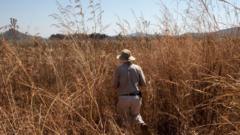In a significant step towards addressing historical injustices, Zimbabwe's government has commenced compensation payments to white farmers as part of a larger agreement aiming to mend ties with Western nations and reconstruct the economy.
Zimbabwe Initiates Historic Compensation for Dispossessed Farmers

Zimbabwe Initiates Historic Compensation for Dispossessed Farmers
The Zimbabwean government begins compensating white farmers for land seized during a contentious land reform initiative.
Article text: The Zimbabwean government has officially embarked on its first compensation payments to white farmers for land seized under a contentious reform program over two decades ago. This initial payout, amounting to US$3 million (£2.3 million), is part of a broader 2020 agreement that commits the state to a total of $3.5 billion (£2.6 billion) for the compensation of seized agricultural land.
This landmark payment addresses the first 378 of the 740 approved farms, representing only 1% of the projected $311 million distribution for the inaugural payments. Zimbabwe Finance Minister Mthuli Ncube revealed that subsequent compensation will be executed through US-dollar denominated Treasury bonds. "One of our commitments as we try to reform the Zimbabwe economy, to clear our arrears, is really to compensate the former farm owners who lost their farms during the land reform programme," Ncube stated, emphasizing the government's dedication to fulfilling the compensation agreement.
Harry Orphanides, a representative of the affected farmers, shared that interest in signing up for the compensation has grown among former landowners. However, many still retain possession of their title deeds and have not yet engaged with the deal. The government has maintained that it will only compensate for improvements made on the land rather than the land itself, defending its stance by citing the unfair nature of the original colonial land grabs.
In January, the Zimbabwean government began compensating foreign investors whose properties were safeguarded via bilateral agreements. After attaining independence in 1980, the country's land reform aimed to redistribute lands held by white farmers, following long-standing colonial practices that excluded black farmers from the nation's most arable areas.
The land seizures, endorsed by then-President Robert Mugabe from 2000 onward, had dire economic repercussions while drawing widespread international criticism. Current President Emmerson Mnangagwa, who assumed office following Mugabe's ousting in a 2017 coup, is striving to repair relations with Western powers. While asserting that land reform cannot be reversed, he has acknowledged compensation as a critical factor in rebuilding diplomatic ties.
Given Zimbabwe's fraught economic history and exclusion from the global financial system for over two decades, analysts view this compensation initiative as a pivotal move towards improving international relations and staving off unfavorable judgments against the nation.
This landmark payment addresses the first 378 of the 740 approved farms, representing only 1% of the projected $311 million distribution for the inaugural payments. Zimbabwe Finance Minister Mthuli Ncube revealed that subsequent compensation will be executed through US-dollar denominated Treasury bonds. "One of our commitments as we try to reform the Zimbabwe economy, to clear our arrears, is really to compensate the former farm owners who lost their farms during the land reform programme," Ncube stated, emphasizing the government's dedication to fulfilling the compensation agreement.
Harry Orphanides, a representative of the affected farmers, shared that interest in signing up for the compensation has grown among former landowners. However, many still retain possession of their title deeds and have not yet engaged with the deal. The government has maintained that it will only compensate for improvements made on the land rather than the land itself, defending its stance by citing the unfair nature of the original colonial land grabs.
In January, the Zimbabwean government began compensating foreign investors whose properties were safeguarded via bilateral agreements. After attaining independence in 1980, the country's land reform aimed to redistribute lands held by white farmers, following long-standing colonial practices that excluded black farmers from the nation's most arable areas.
The land seizures, endorsed by then-President Robert Mugabe from 2000 onward, had dire economic repercussions while drawing widespread international criticism. Current President Emmerson Mnangagwa, who assumed office following Mugabe's ousting in a 2017 coup, is striving to repair relations with Western powers. While asserting that land reform cannot be reversed, he has acknowledged compensation as a critical factor in rebuilding diplomatic ties.
Given Zimbabwe's fraught economic history and exclusion from the global financial system for over two decades, analysts view this compensation initiative as a pivotal move towards improving international relations and staving off unfavorable judgments against the nation.




















